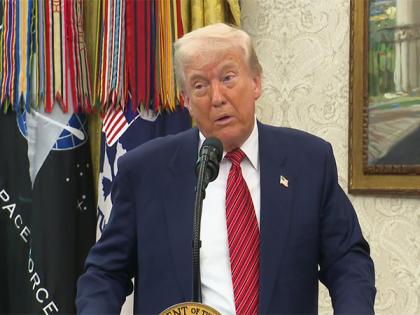Trump's drug order sparks concern for India's pharma policy: GTRI
By ANI | Updated: May 12, 2025 12:42 IST2025-05-12T12:37:21+5:302025-05-12T12:42:36+5:30
New Delhi [India], May 12 : In recent order announced by the US President Donald Trump which aims to ...

Trump's drug order sparks concern for India's pharma policy: GTRI
New Delhi [India], May 12 : In recent order announced by the US President Donald Trump which aims to slash prescriptive drug prices in the United States to be lowered by up to 80 per cent, is likely to create ripple effect in the Global pharmaceutical landscape, raising alarms about potential repercussions for India's pharmaceutical policies, according to a report by Global Trade Research Initiative (GTRI).
Trump's "Most Favored Nation" (MFN) pricing rule will make U.S as the lowest charged country in terms of U.S. drug prices, while this move could lower costs for American patients, it's expected to pressure pharmaceutical companies to seek higher revenues elsewhere, potentially targeting markets like India.
"I am pleased to announce that Tomorrow morning, in the White House, at 9:00 A.M., I will be signing one of the most consequential Executive Orders in our Country's history. Prescription Drug and Pharmaceutical prices will be REDUCED, almost immediately, by 30% to 80%. They will rise throughout the World in order to equalize and, for the first time in many years, bring FAIRNESS TO AMERICA!," Trump wrote on social media Truth Social.
"I will be instituting a MOST FAVOURED NATION'S POLICY whereby the United States will pay the same price as the Nation that pays the lowest price anywhere in the World. Our Country will finally be treated fairly, and our citizens' Healthcare Costs will be reduced by numbers never even thought of before. Additionally, on top of everything else, the United States will save TRILLIONS OF DOLLARS. Thank you for your attention to this matter. MAKE AMERICA GREAT AGAIN!," he further added.
GTRI research says that "While the move may offer immediate relief to American patients, it is likely to trigger a global price recalibrationwith pharmaceutical giants intensifying pressure on lower-cost markets like India to raise their prices by tightening patent laws through trade negotiations"
The report suggests that, "as global pharmaceutical firms turn to FTAS to extract TRIPS-plus commitments, India must hold the line on its patent regimeone that enables affordable access, prevents monopolistic extensions, and safeguards public health."
If India yields to pressures for stronger patent protections, it could hinder competition, delay generic drug availability, and inflate medicine prices, and Trump's MFN pricing policy amplifies these concerns, as pharmaceutical companies may intensify efforts to offset reduced profits in the U.S. by seeking higher prices in markets like India.
Nifty Pharma were down by up to 2.5 per cent in the opening of the market; however, it has revived and is trading flat at the time of filing this report.
Disclaimer: This post has been auto-published from an agency feed without any modifications to the text and has not been reviewed by an editor
Open in app